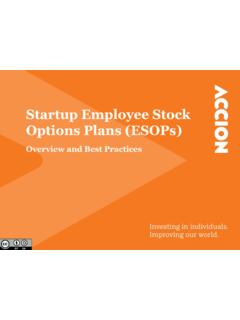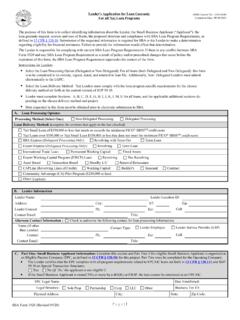Transcription of Long Term Incentive Plans and Deferred Bonus ... - Bird & …
1 Long Term Incentive Plans and Deferred Bonus Plans Introduction Long Term Incentive Plans ("LTIPs") (also sometimes referred to as "Performance Share Plans ") are the most popular form of long term share award for senior executives of listed companies in the UK having progressively out-stripped the alternative of "market value" options over the previous 15 years or so. It has also become increasingly common over the same period for companies to make at least part of annual Bonus awards to senior executives in the form of Deferred shares . LTIPs and Deferred Bonus Plans are similar in some respects as both involve free shares so we have dealt with both here. They are often of equal interest to investors when assessing the overall effectiveness of remuneration packages. Regulatory Requirements In devising these arrangements, companies on the full list of the London Stock Exchange are required to comply with the rules of the Listing Authority and the UK Corporate Governance Code and will usually wish to comply with the guidelines of representatives of institutional investors such as the Investment Association ("IA").
2 Banks, building societies and investment firms may also be required to comply with the Remuneration Code issued by the Prudential Regulation Authority and the Financial Conduct Authority. Companies traded on AIM are required to comply with the AIM Rules for Companies and although the IA. guidelines do not apply, they may choose to adopt similar principles for good governance reasons or to honour previous commitments to shareholders on governance issues. The UK Corporate Governance code does not apply to AIM companies but they may choose to comply with it or the less demanding code of the Quoted Companies Alliance. LTIPs Key Features The key features of LTIPs are: Awards entitle participants to free shares after a performance period (of at least three years) provided service and performance conditions are met.
3 Participation is at the discretion of the remuneration committee and is usually confined to senior executives but may be extended to other employees;. Awards are typically made annually, based on a multiple of base salary;. Awards are invariably subject to comparative and graduated performance targets which are designed to be stretching in order to align the interests of participants and shareholders;. Participants benefit from the "whole value" of shares subject to the award in contrast to "market value". options which are more geared in that they reward only increases in value from the grant date;. Share awards are usually sourced using shares held in an employee share ownership plan trust ("ESOP"). which can purchase or subscribe for shares . Awards can also be sourced using treasury shares but it makes no sense to do this as shares purchased in the market and held in treasury count towards the IA dilution limits whereas shares purchased in the market by an ESOP do not.
4 More recently some Plans have included a retention period of up to two years after vesting and (particularly in the financial services sector) malus and claw-back provisions triggered by business performance or personal misconduct. LTIPs vs Market Value Options LTIPs have become more popular than market value options because: Fewer shares are required (participants receive the whole value of shares so awards are generally made over lower multiples of salary);. Accounting charges are generally lower (particularly for companies with volatile share prices which tend to have an exponential effect on the value of market value options);. Options can be no Incentive when "out of the money" whereas free share awards still have some value if the share price falls;. Performance targets tend to be more demanding so (arguably) aligning better the interests of participants and shareholders.
5 Market value options should not be dismissed out of hand, however, as the tax treatment can be better; in addition they can result in the use of fewer shares if structured so as to be "share settled". A separate fact sheet is available on discretionary share options, which deals with these issues in more detail. Different LTIP Situations LTIPs can generally be structured in one of three ways: Nil cost options Participants are granted an option at the outset which becomes exercisable at the end of a performance period of at least three years to the extent service and performance targets are met. Options typically have a 10 year life. No tax is due until exercise so participants can retain the option after vesting and benefit from the upside on the gross number of shares subject to the award. This gives nil cost options an advantage over the other two ways of structuring LTIPs so we prefer to use nil cost options in the UK and other jurisdictions where possible.
6 Restricted stock units Participants receive a promise or contractually binding right to receive free shares at the end of a performance period of at least three years to the extent service and performance targets are met. Participants are typically taxed on the receipt of the shares . LTIPs usually have to be structured as RSUs in the US, for example, as there is an up-front tax charge on the grant of discounted options but not on the award of RSUs. Restricted stock Participants receive beneficial ownership of shares at the outset but the shares are subject to forfeiture on cessation of employment or on failure to meet performance targets at the end of a performance period of at least three years. UK participants can elect to pay income tax on the value of the shares at the outset thereby benefiting from capital treatment on future gains.
7 Restricted stock is rare in the UK, however, as the up-front tax cost represents a cash-flow disadvantage and the tax cannot be recouped if the shares are later forfeited. Deferred Bonus Plans Deferred Bonus Plans are typically structured in one of two ways: Compulsory arrangements Participants are given no choice, part of their annual Bonus is paid in Deferred shares which are forfeited on cessation of employment during a service period of up to three years. These awards are not typically subject to performance targets. Compulsory deferral arrangements have become far more common than voluntary arrangements over the last 5 years or so. Voluntary arrangements with a matching element Participants may opt to take part of their annual Bonus as a Deferred award of shares with companies offering a matching award of free shares to encourage take-up.
8 The matching element of the award is typically subject to service requirements and to performance conditions measured over a performance period of up to three years. Other key features Other key features of Deferred Bonus arrangements are: Plans can be structured as nil cost options, restricted stock units or even as restricted stock in the same way as LTIPs;. Participation is at the discretion of the remuneration committee and is often extended beyond senior executives;. Participants opt-in to voluntary Plans before their Bonus has been determined to avoid a tax charge at that point (although the recent Rangers Case raises questions as to whether this is treated as a "redirection of earnings");. Awards are usually sourced using shares purchased in the market and held in an ESOP;. More recently Plans have included malus and claw-back provisions particularly in the financial services sector.
9 Shareholder Approval The Listing Rules (broadly) require companies listed on the full list to seek shareholder approval for Plans sourced using new issue shares or in which main board directors are eligible to participate and which measure performance over more than one financial year. Consequently LTIPs typically require shareholder approval whereas Deferred Bonus Plans do not if structured correctly. No such rules apply to AIM traded companies but they may be obliged to seek shareholder approval for good governance reasons or due to prior commitments to shareholders. Tax Treatment The tax treatment of LTIPs and Deferred Bonus Plans depends on how they are structured: Nil cost options No income tax arises until the option is exercised, pay as you earn ("PAYE") and National Insurance contributions ("NIC") will arise at that point if the shares are readily convertible assets.
10 Participants will typically sell all their shares on the date of exercise and part of the sale proceeds will be paid to the employer to enable it to operate withholding. Restricted stock units No income tax arises until participants become unconditionally entitled to the shares , PAYE and NIC will arise at that point if the shares are readily convertible assets. Participants will typically be required to sell sufficient shares on vesting to fund the tax withholding liability. Restricted stock No income tax arises on acquisition (assuming the forfeiture conditions lift within 5 years of acquisition). Income tax arises instead when the forfeiture conditions lift on the full value of the shares at that point. PAYE and NIC apply if the shares are readily convertible assets on each tax point. Alternatively, participants can make an election pursuant to section 431(1) ITEPA 2003 to pay income tax on the "unrestricted market value" of the shares within 14 days of acquisition with the result that subsequent gains on sale are taxed as capital.






